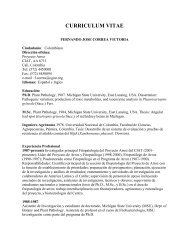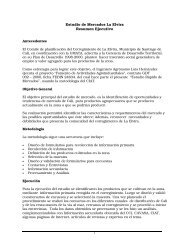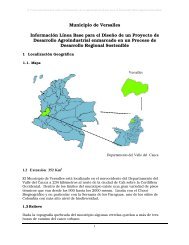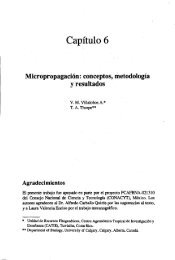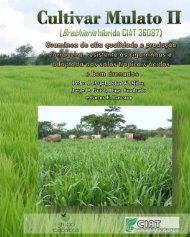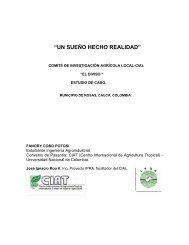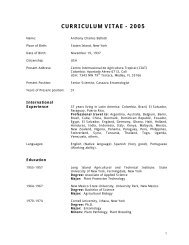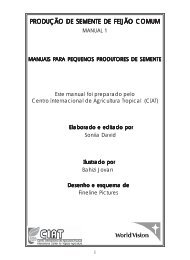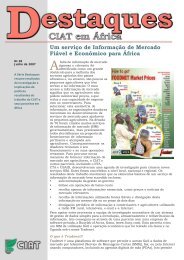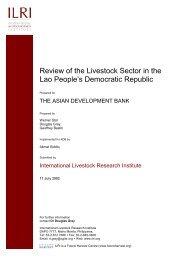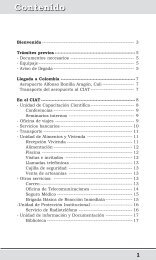'Economy', Sustainability and Sites of Transformative ... - CIAT Home
'Economy', Sustainability and Sites of Transformative ... - CIAT Home
'Economy', Sustainability and Sites of Transformative ... - CIAT Home
Create successful ePaper yourself
Turn your PDF publications into a flip-book with our unique Google optimized e-Paper software.
New Political Economy, Vol. 7, No. 1, 2002<br />
‘Economy’, <strong>Sustainability</strong> <strong>and</strong> <strong>Sites</strong> <strong>of</strong><br />
<strong>Transformative</strong> Space<br />
PAUL LANGLEY & MARY MELLOR<br />
In common with many other commentators, we start from the proposition that<br />
the contemporary global market economy, established through neoliberal economic<br />
theory <strong>and</strong> practice, is both socially <strong>and</strong> ecologically unsustainable. 1 That<br />
is, it cannot reproduce generalised conditions <strong>of</strong> socioeconomic <strong>and</strong> ecological<br />
well-being. We would see sustainability as combining conditions <strong>of</strong> existence<br />
where human beings achieve their potential without exploiting the labour <strong>and</strong><br />
resources <strong>of</strong> other individuals, groups or societies with a level <strong>of</strong> ecological<br />
replenishment necessary not only for human futurity but for the continued<br />
existence <strong>of</strong> other species <strong>and</strong> their ecosystems. Despite evidence <strong>of</strong> increased<br />
global inequality <strong>and</strong> the acknowledgement <strong>of</strong> environmental problems associated<br />
with ‘development’ in international political circles, neoliberal globalisation<br />
continues to be represented as though there is no viable politico-economic<br />
alternative. 2<br />
In the face <strong>of</strong> the apparently immobilising structural constraints <strong>of</strong> neoliberal<br />
economic thought <strong>and</strong> practice, 3 political economists critical <strong>of</strong> the contemporary<br />
global market have sought to identify potential sites <strong>of</strong> transformative political<br />
space. Both state institution s <strong>and</strong> an emerging global civil society have been<br />
identi� ed as spaces that, through conceptual <strong>and</strong> sociopolitical contestation, hold<br />
out the possibility <strong>of</strong> enabling transformative political strategies. 4 We would not<br />
wish to deny the prospective importance <strong>of</strong> global civil society or even the<br />
promise <strong>of</strong> state institution s as transformative spaces able to facilitate strategies<br />
for the establishment <strong>of</strong> egalitarian <strong>and</strong> ecologically benign socioeconomic<br />
relations. Yet it is our argument that seeking potential sites <strong>of</strong> transformative<br />
space in state institutions <strong>and</strong> global civil society can be greatly enhanced by<br />
linking these with sites that already exist or are opening up within ‘economy’.<br />
In this article, then, we want to identify <strong>and</strong> re� ect upon potential sites <strong>of</strong><br />
transformative space within ‘economy’ itself.<br />
The article begins by challenging the ideological <strong>and</strong> totalising claims <strong>of</strong><br />
neoliberalism as it has come to de� ne contemporary common sense representations<br />
<strong>of</strong> ‘economy’. We argue that the neoliberal claim that economy is socially<br />
or ecologically disembedded is a mysti� cation. The neoliberal assertion that<br />
Paul Langley & Mary Mellor, School <strong>of</strong> Social, Political <strong>and</strong> Economic Sciences, University <strong>of</strong><br />
Northumbria at Newcastle, Northumberl<strong>and</strong> Building, Newcastle upon Tyne NE1 8ST, UK.<br />
ISSN 1356-3467 print; ISSN 1469-9923 online/02/010049-17 Ó 2002 Taylor & Francis Ltd<br />
DOI: 10.1080/1356346012011551 6<br />
49
Paul Langley & Mary Mellor<br />
human nature conforms to the behaviour <strong>of</strong> ‘economic man’ is also shown to be<br />
unsubstantiated , particularly when women’s work <strong>and</strong> the epistemological bases<br />
<strong>of</strong> this claim are taken into account. In the second part <strong>of</strong> the article we move<br />
to problematise further the tendency to equate ‘economy’ with ‘market’, developing<br />
instead a disaggregated underst<strong>and</strong>ing <strong>of</strong> economy as a multilayered social<br />
structure constituted by sets <strong>of</strong> provisioning <strong>and</strong> non-provisionin g practices. The<br />
market <strong>and</strong> its constitutive practices are seen as only one part or layer <strong>of</strong><br />
economy. A disaggregated underst<strong>and</strong>ing <strong>of</strong> economy is essential in order to<br />
identify <strong>and</strong> open up those spaces within economy that could enable transformative<br />
action. We will stress that, despite the contemporary advance <strong>of</strong> global<br />
markets in terms <strong>of</strong> extent <strong>and</strong> intensity, there remains potential space within<br />
economy for transformative strategies to achieve genuinely sustainable social<br />
relations. The � nal part <strong>of</strong> the article illustrates this with reference to spaces<br />
based in practices <strong>of</strong> provisioning that lie outside both the formal market <strong>and</strong> the<br />
state. Throughout the discussion we draw upon the insights made available to us<br />
by bringing together institutionalis t <strong>and</strong> neoMarxist approaches with ec<strong>of</strong>eminist<br />
political economy.<br />
Contesting neoliberal economy<br />
Neoliberalism has come to de� ne the common sense underst<strong>and</strong>ing <strong>of</strong> ‘economy’<br />
in our age. 5 We will term this orthodoxy ‘neoliberal economy’. Neoliberal<br />
economy combines <strong>and</strong> re-articulates two theoretical conceptualisation s <strong>of</strong> economy<br />
derived from classical political economy which Caporaso <strong>and</strong> Levine term<br />
‘the economy’ <strong>and</strong> ‘economic calculation’. 6 ‘The economy’ is a conceptualisation<br />
<strong>of</strong> economy that, informed by liberal economics broadly, begins from the<br />
assumption that economy constitutes ‘a separable entity … a distinct set <strong>of</strong><br />
(market) relations between persons not in essence political or familial’. 7 As such,<br />
‘economy’ <strong>and</strong> ‘market’ tend to be equated <strong>and</strong> used interchangeably in common<br />
sense parlance. Meanwhile, ‘economic calculation’ draws upon the neoclassical<br />
liberal economics <strong>of</strong> the late 19th <strong>and</strong> early twentieth centuries <strong>and</strong> emphasises<br />
economy as a rational <strong>and</strong> utility maximising mode <strong>of</strong> behaviour. The combination<br />
<strong>of</strong> economy as separable realm with economy as behaviour is mutually<br />
reinforcing. Economy becomes a technical realm replete with its own market<br />
logic that emerges from the natural rational characteristics <strong>of</strong> homo economicus.<br />
Economy is thus presented as both distinct <strong>and</strong> universal. Perhaps most<br />
signi� cantly, the market economy takes on a naturalised, transhistorica l <strong>and</strong><br />
universal quality, pushing inexorably across space <strong>and</strong> enduring throughout time.<br />
As David Williams notes:<br />
50<br />
The current popular discourses all rely on a view that marketbased<br />
economic arrangements are more or less natural. Even<br />
those arguments which accept that there remains an important role<br />
for the state in setting the ‘right’ economic policies, or providing<br />
an effective regulatory <strong>and</strong> institutiona l environment for the<br />
market, nonetheless rely on the view that, at bottom, market-
‘Economy’ <strong>and</strong> Sustainabilit y<br />
based economic arrangements are natural because they are the<br />
product <strong>of</strong> an economic rationality inherent in all persons. 8<br />
Claims about human nature undercut <strong>and</strong> strip away potential objections to<br />
neoliberal economy, while a belief in the ef� cacy <strong>of</strong> the market mechanism<br />
ensures that individual interests are seen to be compatible with, even necessary<br />
for, the advancement <strong>of</strong> the universal social good.<br />
Empiricist epistemology <strong>and</strong> positivist methodology provide the metatheoretical<br />
underpinnings that legitimate neoliberal economy. The widespread acceptance<br />
<strong>of</strong> neoliberal economy is intimately bound up with the exclusionary<br />
production <strong>of</strong> knowledge about economy that serves to ‘� x’ the common sense. 9<br />
Economy is effectively mysti� ed as alternative, plausible conceptualisation s <strong>of</strong><br />
economy are rendered problematic. In particular, ontological assumptions <strong>of</strong><br />
economy as a rational mode <strong>of</strong> behaviour are both predicated on <strong>and</strong> reinforced<br />
by the individualis t methodology <strong>of</strong> positivism. 10 As a � eld <strong>of</strong> inquiry, economics<br />
comes to st<strong>and</strong> alone in the social sciences as being united as much by its<br />
methodological predispositio n as by the subject matter that is its focus. 11 Such<br />
is the heady, circularly-reinforcing combination <strong>of</strong> ontology, epistemology <strong>and</strong><br />
methodology in neoliberal economy that Hodgson <strong>and</strong> Fine see contemporary<br />
economics as ‘colonising’ other branches <strong>of</strong> the social sciences. 12 Not only does<br />
economy as a mode <strong>of</strong> rational behaviour become applied to the study <strong>of</strong><br />
socioeconomic life, but, with the development <strong>of</strong> rational choice theory, it tends<br />
to come to frame analysis <strong>of</strong> all aspects <strong>of</strong> social <strong>and</strong> political life. The primacy<br />
<strong>of</strong> rational economic motives is seen as taking precedence over <strong>and</strong> above other<br />
con� icting <strong>and</strong> transient motivations such as emotions, attachments <strong>and</strong> desires.<br />
Demystifying ‘economy’<br />
The attack on the neoliberal assertion <strong>of</strong> the disembedded economy (economy as<br />
a separable realm) has long been associated with the work <strong>of</strong> Karl Polanyi. On<br />
the � rst page <strong>of</strong> his critical account <strong>of</strong> the 19th-century imposition <strong>of</strong> the<br />
self-regulating market, Polanyi claims that ‘a self-adjusting market … could not<br />
exist for any length <strong>of</strong> time without annihilating the human <strong>and</strong> natural substance<br />
<strong>of</strong> society; it would have physically destroyed man <strong>and</strong> destroyed his surroundings<br />
into a wilderness’. 13 Resting upon a metatheoretical basis that does not<br />
preclude consideration <strong>of</strong> historical structures <strong>and</strong> shifting <strong>and</strong> multiple social<br />
motivations, Polanyi’s work suggests that economy is not, contrary to neoliberalism,<br />
a realm <strong>of</strong> market relations separable from nature <strong>and</strong> society. Furthermore,<br />
Polanyi also casts the neoliberal conceptualisation <strong>of</strong> economy as a<br />
universal mode <strong>of</strong> behaviour as an ‘economistic fallacy’. 14 A market society that<br />
ideologically claims <strong>and</strong> behaves as if the market is a separate phenomenon is<br />
not a natural result <strong>of</strong> human nature, but a political construct. As such <strong>and</strong><br />
following Polanyi, it is only through the liberalisation, privatisation <strong>and</strong> deregulatory<br />
initiatives <strong>of</strong> the powerful states that today’s economy becomes the<br />
separate realm <strong>of</strong> the market marked by the pursuit <strong>of</strong> private self-interest by<br />
utility maximisers. 15<br />
51
Paul Langley & Mary Mellor<br />
Polanyi’s warning as to the unsustainable social <strong>and</strong> ecological consequences<br />
<strong>of</strong> the disembedding <strong>of</strong> economic practices is echoed <strong>and</strong> developed by contemporary<br />
green political economists. From a variety <strong>of</strong> perspectives, green political<br />
economists point to the contradictions <strong>and</strong> tensions that emerge from neoliberal<br />
efforts to commodify social <strong>and</strong> natural relations, thereby bracketing the economy<br />
from society <strong>and</strong> nature. For instance, ecological economists highlight that<br />
ecological costs cannot be measured in line with positivism, but are quite<br />
literally incalculable as there is no commensurability between environmental <strong>and</strong><br />
economic values. 16 Meanwhile, ecoMarxists stress the inseparability <strong>of</strong> the<br />
analysis <strong>of</strong> material con� icts from their ecological framework. 17 As James<br />
O’Connor argues, disembedded capitalist markets not only foul their own nest<br />
ecologically but also undermine the capacity <strong>of</strong> societies to reproduce infrastructural<br />
<strong>and</strong> human resources through family, state <strong>and</strong> community structures. 18<br />
Feminist <strong>and</strong> ec<strong>of</strong>eminist political economy also serves to demystify the<br />
neoliberal claim that economy is a distinct realm that is separable from society<br />
<strong>and</strong> nature. Central to feminism is the claim that the formal economy, which<br />
includes all valued activities whether in the public or market sector, rests on<br />
other economic practices in which women’s work predominates. 19 Social power<br />
relations <strong>of</strong> exploitation <strong>and</strong> dependency are present that are obscured by the<br />
bracketing <strong>of</strong> economy from society. As Gardiner summarises:<br />
The traditional dualistic treatment <strong>of</strong> households <strong>and</strong> markets as<br />
separate spheres, within both mainstream social science <strong>and</strong><br />
Marxism, is therefore problematic from a feminist perspective<br />
because it supported the exclusion <strong>of</strong> households <strong>and</strong> domestic<br />
labour from economic analysis <strong>and</strong> the neglect <strong>of</strong> gender inequality.<br />
Both market <strong>and</strong> household behaviour were misrepresented,<br />
the former as exclusively individualistic , self-interested<br />
<strong>and</strong> competitive, the latter as exclusively altruistic, harmonious<br />
<strong>and</strong> cooperative. 20<br />
As such, the concept ‘economy’ is recognised as attached to particular market<br />
practices both in theory <strong>and</strong> practice. Economic practices are embedded in<br />
society <strong>and</strong> nature <strong>and</strong> the consequences <strong>of</strong> this embeddedness are not immediately<br />
apparent as they tend to be borne by others in the process that Mellor has<br />
described as deep materialism. 21 From this perspective the adverse outcomes <strong>and</strong><br />
extra-market dem<strong>and</strong>s <strong>of</strong> rational market practices are represented in the lives<br />
<strong>and</strong> work <strong>of</strong> women, the dispossession <strong>of</strong> peoples from their l<strong>and</strong> <strong>and</strong> livelihood,<br />
the destruction <strong>of</strong> natural habitat <strong>and</strong> the general degradation <strong>of</strong> the environment.<br />
Feminist political economy thus provides a basis from which to begin to<br />
demystify the neoliberal claim that economy as a mode <strong>of</strong> behaviour is a<br />
re� ection <strong>of</strong> human nature, highlighting the false separation <strong>of</strong> utility maximising<br />
‘economic man’ from the wider economy <strong>of</strong> women. 22 Under neoliberal<br />
economy, the social practices <strong>of</strong> ‘women’s work’ that are subject to a wide range<br />
<strong>of</strong> motivations are, despite their undoubted importance for human existence,<br />
deemed non-economic <strong>and</strong> in some instances irrational. 23 As one <strong>of</strong> us has<br />
discussed more fully elsewhere, ‘economic man’ is both an ideal <strong>and</strong> a reality<br />
in that many individuals, usually men, can live as if they are rational, calculating,<br />
52
‘Economy’ <strong>and</strong> Sustainabilit y<br />
individualise d economic actors because <strong>of</strong> the underlabouring work <strong>of</strong> women<br />
<strong>and</strong> other exploited <strong>and</strong> subordinated groups. 24<br />
Of course, the ‘reality’ <strong>of</strong> economic man is further predicated on the<br />
exclusionary grip <strong>of</strong> empiricism <strong>and</strong> positivism on the creation <strong>of</strong> common sense<br />
underst<strong>and</strong>ings <strong>of</strong> economy. The rise to predominance <strong>of</strong> neoclassical economics<br />
in the late 19th century, establishing the ideas <strong>of</strong> economic calculation as a mode<br />
<strong>of</strong> behaviour that exempli� ed the Western rationalist tradition, was central to the<br />
legitimation <strong>of</strong> the self-regulating market. Casting economy as the separate<br />
realm for the exercise <strong>of</strong> private interest requires the articulation <strong>of</strong> a common<br />
moral language, expressed in terms <strong>of</strong> rational self-interest such that moral<br />
obligations to others can be satis� ed only by � rst satisfying obligations to the<br />
self. 25 The social relations between individuals are dissolved as all interaction<br />
services economic self-interests, i.e. the articulation <strong>of</strong> economy as a mode <strong>of</strong><br />
calculating behaviour is essential for separation <strong>of</strong> economy from society. The<br />
assertion that human nature conforms to the behaviour <strong>of</strong> calculating, rational<br />
economic man is shown to be unsubstantiate d when women’s work <strong>and</strong> the<br />
epistemological basis <strong>of</strong> this claim are taken into account.<br />
Disaggregating ‘economy’<br />
In this section <strong>of</strong> the article we seek to problematise further the neoliberal<br />
equation <strong>of</strong> ‘economy’ with ‘market’, with a particular focus on the provisioning<br />
<strong>of</strong> societies. For Caporaso <strong>and</strong> Levine,<br />
The spirit <strong>of</strong> the provisioning approach emphasises material<br />
goods over nonmaterial, <strong>of</strong>ten giving the former a special status<br />
<strong>and</strong> larger role in economic affairs. While not inevitable, this<br />
emphasis follows naturally from the perspective that sees provisioning<br />
as a kind <strong>of</strong> material circulation <strong>of</strong> the things necessary to<br />
sustain life—to provide nutrition, warmth, <strong>and</strong> shelter. The provisioning<br />
approach focuses our attention on our basic needs <strong>and</strong> the<br />
goods that sustain life in its more elemental senses. 26<br />
Feminist political economists have done much to develop the provisioning<br />
approach. 27 Indeed, a theoretical conception <strong>of</strong> economy as ‘provisioning ’ has<br />
been central to the challenge by feminist political economy to male-stream<br />
neoliberal economy. Drawing on this work <strong>and</strong> in contrast to Caporaso <strong>and</strong><br />
Levine, our underst<strong>and</strong>ing <strong>of</strong> provisioning would include social <strong>and</strong> emotional as<br />
well as physical needs. Two implications follow. First, the concept <strong>of</strong> provisioning<br />
no longer comprehends need in a simple-rational, materialist manner such<br />
that knowledge <strong>of</strong> economy is not bound by the same metatheoretical con� nes<br />
as neoliberalism. Alternative underst<strong>and</strong>ings <strong>of</strong> economy can be developed<br />
which, by recognising the epistemological implications <strong>of</strong> an ontology <strong>of</strong><br />
historicity, maintain a ‘transformative’ or ‘ameliorative’ purpose. 28 Second, we<br />
would not see the main distinction within economy as between material/nonmaterial,<br />
but between provisioning /non-provisioning . Socioeconomic practices<br />
can thus be differentiated between the meeting <strong>of</strong> human needs <strong>and</strong> market/<br />
� nancial noise.<br />
53
Paul Langley & Mary Mellor<br />
If markets fully <strong>and</strong> exclusively provisioned societies, then, in line with<br />
neoliberalism, it would follow that ‘economy’ <strong>and</strong> ‘market’ could be equated. It<br />
would also need to be the case that provisioning was the primary motivation <strong>of</strong><br />
a market mode <strong>of</strong> behaviour. Neither <strong>of</strong> these statements can be said to be true<br />
<strong>of</strong> the market. It does not fully provision human societies, nor is provisioning the<br />
primary motivation <strong>of</strong> market actors. Both the ideology <strong>of</strong> neoliberal economy<br />
<strong>and</strong> the social <strong>and</strong> political power relations that underpin the practices <strong>of</strong><br />
neoliberal economy, serve to subordinate the satisfying <strong>of</strong> human need to<br />
� nancial calculation. This would indicate that it is necessary to consider the<br />
notion <strong>of</strong> economy as distinct from market in both theory <strong>and</strong> practice. In the<br />
argument that follows we advance a disaggregated underst<strong>and</strong>ing <strong>of</strong> the contemporary<br />
economy that views economy as a multilayered social structure constituted<br />
by sets <strong>of</strong> provisioning <strong>and</strong> non-provisionin g practices. The market <strong>and</strong><br />
market practices are, then, only one part or layer <strong>of</strong> economy.<br />
Financial <strong>and</strong> real economies<br />
There is nothing intrinsically ‘new’ about disaggregating economy. Many<br />
contemporary political economists distinguish the ‘symbolic’ or ‘casino’ economy<br />
<strong>of</strong> securitised global � nance from the ‘real’ economy <strong>of</strong> trade, production<br />
<strong>and</strong> exchange. 29 Such ideas draw on a long lineage <strong>of</strong> thought that stretches back<br />
to Aristotle’s distinction between the speculative <strong>and</strong> non-provisionin g economics<br />
<strong>of</strong> ‘chrematistics’ <strong>and</strong> the home economics <strong>of</strong> ‘oikonomia’. While the notion<br />
<strong>of</strong> ‘real economy’ still tends to con� ate economy with market, the distinction<br />
between � nancial <strong>and</strong> real economies provides a useful starting point. Despite<br />
the commodi� ying pressures exerted through the � nancial economy, the contemporary<br />
extension <strong>and</strong> intensi� cation <strong>of</strong> global market relations throughout the<br />
‘real’ economy is currently incomplete <strong>and</strong> remains riddled with a myriad <strong>of</strong><br />
contradictions. 30 We would argue, therefore, that the disaggregation <strong>of</strong> � nancial<br />
<strong>and</strong> ‘real’ economies does not go far enough. The ‘real economy’ itself needs to<br />
be disaggregated.<br />
Disaggregating the real economy<br />
Fern<strong>and</strong> Braudel <strong>and</strong> Karl Polanyi both provide a disaggregated underst<strong>and</strong>ing<br />
<strong>of</strong> the ‘real’ economy. Given the in� uence <strong>of</strong> these thinkers over the<br />
construction <strong>of</strong> what has been variously called ‘new’ or ‘heterodox’ (international)<br />
political economy, it is somewhat surprising that this common element<br />
<strong>of</strong> their work has tended to be largely neglected by contemporary political<br />
economists. 31<br />
Fern<strong>and</strong> Braudel’s history <strong>of</strong> the pyramidal world economy from the 15th to<br />
19th centuries addresses restructuring across three hierarchical social realms<br />
which he terms ‘capitalism’, ‘market economy’ <strong>and</strong> ‘material life’. 32 ‘Capitalism’<br />
st<strong>and</strong>s at the apex <strong>of</strong> the world economy, a narrow layer <strong>of</strong> economic life<br />
characterised not in terms <strong>of</strong> the means <strong>of</strong> production but by the largely<br />
speculative reproduction <strong>of</strong> capital for its own sake on a massive scale. 33 In the<br />
contemporary world economy, the realm <strong>of</strong> capitalism is the preserve <strong>of</strong><br />
54
‘Economy’ <strong>and</strong> Sustainabilit y<br />
symbolic global capital <strong>and</strong> equity market practices <strong>and</strong> top-level real estate,<br />
insurance <strong>and</strong> other information industries. 34 Immediately below the domain <strong>of</strong><br />
capitalism st<strong>and</strong>s the ‘market economy’, the realm <strong>of</strong> regular <strong>and</strong> relatively<br />
transparent patterns <strong>of</strong> exchange through local <strong>and</strong> national markets. 35 The<br />
present scope <strong>of</strong> the market economy shows signs <strong>of</strong> reaching regional proportions<br />
in North America, Europe <strong>and</strong> Asia. 36 At the base <strong>of</strong> the world economy<br />
st<strong>and</strong>s the realm <strong>of</strong> ‘material life’, the vast world <strong>of</strong> those daily routines<br />
encompassing domestic life that service the central needs <strong>of</strong> social reproduction.<br />
37 In contrast to the realm <strong>of</strong> the market economy where ‘exchange<br />
value’ predominates, socioeconomic practices in the domain <strong>of</strong> material life are<br />
motivated by ‘use value’. 38 Material life contains those embedded social,<br />
political <strong>and</strong> institutiona l dynamics that combine to constrain commodi� cation<br />
structurally.<br />
Polanyi identi� ed three circuits <strong>of</strong> the economy—exchange, redistribution <strong>and</strong><br />
reciprocity. 39 Exchange is the realm associated with the market, redistribution<br />
the realm <strong>of</strong> state taxation <strong>and</strong> subsidies, <strong>and</strong> reciprocity that <strong>of</strong> socioeconomic<br />
practices that neoliberal economy would regard as non-economic. Drawing upon<br />
Polanyi’s work, feminist political economists such as Runyan have further<br />
stressed the gendered nature <strong>of</strong> the layers <strong>of</strong> the real economy. The realm <strong>of</strong><br />
reciprocity becomes ‘where women predominate as volunteer workers in the<br />
community <strong>and</strong> as unremunerated caretakers <strong>of</strong> children <strong>and</strong> the elderly’. 40<br />
While many feminists would question whether domestic, communal <strong>and</strong> subsistence<br />
work done by women is characterised by reciprocity, 41 others have<br />
nonetheless made the case that this work should be recognised as constituting a<br />
highly signi� cant aspect <strong>of</strong> the world economy. 42 Feminist campaigns on this<br />
issue have led to some formal attempts to account for women’s work. For<br />
example, the UN Development Programme in 1995 estimated that, while men<br />
<strong>and</strong> women’s paid labour in the world economy was worth US$23 trillion,<br />
women’s unpaid work was worth an additional US$11 trillion. 43<br />
Feminist political economy also provides us with an underst<strong>and</strong>ing <strong>of</strong> the<br />
relationships between the various realms or layers <strong>of</strong> the real economy suggested<br />
by the work <strong>of</strong> Braudel <strong>and</strong> Polanyi. As feminists have long argued, no income<br />
can be earned until basic care work has been done. In this sense the formal<br />
economy <strong>of</strong> state <strong>and</strong> market depends on the ef� cacy <strong>of</strong> household <strong>and</strong><br />
social/communal structures. As Hilkka Pietila summarises:<br />
If the human maintenance—mental <strong>and</strong> physical—<strong>and</strong> the nurturance<br />
<strong>of</strong> human beings are not taken care <strong>of</strong>, no other economy<br />
is possible. Thus the household is basic not only for the economy,<br />
but for the whole society, for the survival <strong>of</strong> the human species.<br />
Therefore the picture <strong>of</strong> the human economy should be turned the<br />
right side up: the industrial <strong>and</strong> commercial economy should be<br />
seen as auxiliary, serving the needs <strong>of</strong> families <strong>and</strong> individuals<br />
instead <strong>of</strong> using them as means <strong>of</strong> production <strong>and</strong> consumption. 44<br />
The dependence <strong>of</strong> the formal economy on women’s role in provisioning<br />
practices is particularly clear in less industrialised societies. Here women’s<br />
55
Paul Langley & Mary Mellor<br />
agricultural <strong>and</strong> gathering work (fuelwood/water) is <strong>of</strong>ten the last to leave the<br />
subsistence sector <strong>and</strong> the � rst to return to it when the market fails. 45<br />
An economic system designed to start from women’s provisioning work rather<br />
than the market would clearly view socioeconomic practices very differently. It<br />
would start from economic concepts that are use-based rather than exchangebased.<br />
While those socioeconomic practices that provision the well-being <strong>of</strong><br />
society occur both ‘inside’ <strong>and</strong> ‘outside’ the market economy in a Braudelian<br />
sense, exchange value rather than use value is the predominant motivation <strong>of</strong><br />
market practices. If there is not a pro� t to be made, the market economy will not<br />
provide. Where the market ‘fails’ <strong>and</strong> unless a variety <strong>of</strong> strategies emerge,<br />
whether based on families, communities, state-societies or self-help, real suffering<br />
will ensue. The assertion within conventional economics that it is not<br />
possible to distinguish between needs <strong>and</strong> wants becomes irrelevant in the face<br />
<strong>of</strong> market failure. Within the sphere <strong>of</strong> women’s work <strong>and</strong> other practices<br />
primarily motivated by provisioning , the distinction between needs <strong>and</strong> wants is<br />
<strong>of</strong>ten very clear.<br />
Given the current commodifying advance <strong>of</strong> the global market, it might be<br />
tempting to assume that in the contemporary era practices can no longer be<br />
motivated primarily by provisioning. For instance, Helleiner uses Braudelian<br />
terms to assert that the exp<strong>and</strong>ed reach <strong>of</strong> capitalism <strong>and</strong> the market economy<br />
since the late 1960s is leading to a ‘hierarchical compression’ in the world<br />
economy such that the signi� cance <strong>of</strong> material life is eroded. 46 This has<br />
stimulated another Braudelian to comment that ‘it is perhaps not too much to say<br />
that in the contemporary period the market economy is the basic sub-stratum <strong>of</strong><br />
society’. 47 Indeed, women’s work in the contemporary household may be<br />
becoming commodi� ed to a certain extent (e.g. laundries, childcare, nursing<br />
homes, fastfood, counsellors). There are, however, limits both to the theory <strong>and</strong><br />
practice <strong>of</strong> subjecting the realm <strong>of</strong> material life to market relations, particularly<br />
those arising from the mental horizons <strong>of</strong> rituals <strong>and</strong> routines <strong>and</strong> the durability<br />
<strong>of</strong> communal <strong>and</strong> familial relationships. For instance, as one <strong>of</strong> us has argued<br />
elsewhere, limits on the commodi� cation <strong>of</strong> household work stem from its<br />
structural inability to conform to time-limited or money-valued frameworks. 48<br />
The most signi� cant aspect <strong>of</strong> formal economic labour is that it is limited either<br />
by its time frame (the working day) or by its money value (what someone will<br />
pay for it). Women’s work can conform to neither criterion as it is largely<br />
associated with the life <strong>of</strong> the body, re� ecting the life-cycle <strong>and</strong> daily cycle <strong>of</strong><br />
human existence. As such, it is work that � ows with what Mellor has described<br />
as ‘biological time’: the need to eat <strong>and</strong> sleep, to grow <strong>and</strong> mature, to age <strong>and</strong><br />
die. It is possible to stretch these boundaries but not to break them. 49<br />
Drawing upon the concept <strong>of</strong> provisioning <strong>and</strong> informed by the heterodox<br />
insights <strong>of</strong> a broad range <strong>of</strong> political economists, then, it becomes possible to<br />
disaggregate economy. Economy in this context is shown not to be equivalent to<br />
the market, but instead can be seen in various ways as a multilayered social<br />
structure (e.g. capitalism, market <strong>and</strong> material life) constituted by practices<br />
subject to the motivations <strong>of</strong> both provisioning <strong>and</strong> non-provisioning . Motivations<br />
<strong>of</strong> non-provisionin g include principally pro� teering through speculation<br />
<strong>and</strong> exchange-value, but also status, display <strong>and</strong> their like. We would not deny<br />
56
‘Economy’ <strong>and</strong> Sustainabilit y<br />
that market practices are signi� cant to provisioning , particularly given the<br />
contemporary extension <strong>and</strong> intensi� cation <strong>of</strong> the globalised market <strong>and</strong><br />
the pressures for commodi� cation exerted through global � nance. However, it is<br />
the non-market practices which dominate the realm that Braudel terms ‘material<br />
life’ that continue to form the basis for provisioning . Indeed, both � nancial<br />
practices framed by the desire to generate capital for its own sake <strong>and</strong> market<br />
practices that are driven by exchange value are themselves dependent upon<br />
subsistence <strong>and</strong> household practices <strong>and</strong> the capacity <strong>of</strong> the natural environment<br />
to provide raw materials <strong>and</strong> absorb waste. Armed with a disaggregated<br />
underst<strong>and</strong>ing <strong>of</strong> economy, the potential for transformative spaces outside or<br />
adjacent to state <strong>and</strong> market <strong>and</strong> based upon the practices <strong>of</strong> provisioning begins<br />
to be revealed.<br />
<strong>Transformative</strong> spaces in ‘economy’<br />
The heart <strong>of</strong> our critique <strong>of</strong> neoliberal economy is that it collapses <strong>and</strong> subsumes<br />
many different activities <strong>and</strong> meanings that could be described as ‘economic’<br />
within the framework <strong>of</strong> pro� t-centred market exchange while leaving outside<br />
many others. The strength <strong>of</strong> the contemporary market economy is that it does<br />
provide much that is necessary in highly commodi� ed societies, <strong>and</strong> much that<br />
is not, thus feeding consumerism <strong>and</strong> obsolescence. This would not necessarily<br />
be a problem if the resources <strong>of</strong> the world were limitless <strong>and</strong> if the contemporary<br />
promise <strong>of</strong> jam for everyone did not coincide with increased inequalities within<br />
<strong>and</strong> between societies. 50 The only solution <strong>of</strong>fered by governments <strong>and</strong> international<br />
agencies to this dilemma is more <strong>of</strong> the same as structural adjustment<br />
policies bite ever harder. Even where there is a commitment to social democracy<br />
at the national level, state action appears unlikely to realise sustainability . 51 As<br />
Paterson argues:<br />
States should be seen as themselves part <strong>of</strong> a globalising capitalist<br />
dynamic, which is fundamentally ecologically problematic.<br />
Social-democratic politics, as simply a different means <strong>of</strong> organising<br />
capitalist economies <strong>and</strong> a different variant <strong>of</strong> the liberaldemocratic<br />
state, is itself just as subject to the ecological<br />
pathologies <strong>of</strong> capitalism as is neoliberalism. Such states are still<br />
fundamentally capitalist states <strong>and</strong>, as such, structurally required<br />
to promote capital accumulation, which immerses them in what<br />
some call the second contradiction <strong>of</strong> capitalism, that between<br />
the forces <strong>of</strong> production <strong>and</strong> the conditions <strong>of</strong> production, i.e.<br />
ecology. 52<br />
Therefore in this closing section we will look for spaces in practices <strong>of</strong><br />
provisioning outside both the state (public economy) <strong>and</strong> the formal market as<br />
an anchor for potential transformation. Three overlapping but distinguishable<br />
sets <strong>of</strong> provisioning practices can be identi� ed in ideal-typical terms: domestic–<br />
local subsistence, ab<strong>and</strong>oned–informal <strong>and</strong> associational–voluntaristic.<br />
57
Domestic–local subsistence<br />
Paul Langley & Mary Mellor<br />
The importance <strong>of</strong> retaining or regaining control over the local provisioning <strong>of</strong><br />
basic subsistence needs in the context <strong>of</strong> highly industrialise d <strong>and</strong> marketised<br />
societies forms a central plank <strong>of</strong> much contemporary green thinking. Greens<br />
bring together the idea <strong>of</strong> the local as ecologically sustainable <strong>and</strong> as democratically<br />
desirable. 53 Ecologically, local production is seen as more sustainable as<br />
it avoids the energy costs <strong>of</strong> transport <strong>and</strong> makes it much more dif� cult to<br />
disguise externalities. Emphasising local control also puts resources in the h<strong>and</strong>s<br />
<strong>of</strong> local people which, it is argued, they would use within the principle <strong>of</strong><br />
suf� ciency rather than pro� igacy.<br />
Domestic-local subsistence provisioning practices are arguably the original<br />
form <strong>of</strong> economic organisation <strong>and</strong> that is why we have linked them in this<br />
category. In industrialise d <strong>and</strong> commodi� ed societies such as Britain where very<br />
little original subsistence provisioning remains apart from the remnants <strong>of</strong> urban<br />
allotments, 54 unpaid (women’s) work in the household <strong>and</strong> community is the<br />
most substantial non-commodi� ed sector. While the link between domestic work<br />
<strong>and</strong> subsistence production continues to be seriously challenged in developed<br />
state-societies, this is not the case for the village economies <strong>of</strong> the South in<br />
which women’s work is central. 55 Here the argument is being made that the<br />
global market should be resisted in favour <strong>of</strong> retaining subsistence production.<br />
For instance, Veronika Bennholdt Thomsen <strong>and</strong> Maria Mies make a strong case<br />
for the transformative space <strong>of</strong> contestation in <strong>and</strong> around subsistence production<br />
in which women are seen as playing a central role. 56 Like V<strong>and</strong>ana Shiva, they<br />
seek to defend existing subsistence economies <strong>and</strong> the remnants <strong>of</strong> commonsbased<br />
provisioning . 57 Even in cities they argue for a ‘re-commonisation’ to give<br />
people back direct access to food resources by building strong links between<br />
local farmers <strong>and</strong> urban consumers as well as reclaiming derelict l<strong>and</strong> for urban<br />
farming.<br />
The aim to roll back neoliberal economic globalisation by re-establishing or<br />
retaining what Goldsmith has called ‘vernacular communities’ is not without<br />
problems. 58 Traditional rural communities are <strong>of</strong>ten limiting for women <strong>and</strong> also<br />
harbour structures <strong>of</strong> inequality. 59 Feminists are in a dif� cult position if domestic/caring<br />
work is seen as a symbol <strong>of</strong> radical social change, as the unequal<br />
treatment <strong>of</strong> women as domestic workers is <strong>of</strong>ten central to their arguments. 60<br />
Peterson, on the other h<strong>and</strong>, sees the household <strong>and</strong> the community as a focal<br />
point ‘not only <strong>of</strong> collaboration <strong>and</strong> reproduction but also resistance <strong>and</strong><br />
transformation’. 61 In addition, as Ellen effectively warns us, siting transformative<br />
space in subsistence practices is also not straightforward. 62 Concepts such as<br />
‘local’, ‘traditional’ or ‘indigenous’ do not capture the changes in the theory/<br />
practice <strong>of</strong> subsistence. As transnational corporations increasingly seek to patent<br />
so-called ‘local’ knowledge, transformation based in subsistence practices must<br />
ensure that knowledge <strong>of</strong> the environment is the inheritance <strong>of</strong> the people<br />
engaged in subsistence practices.<br />
We would argue that it is not necessary to support repressive domestic<br />
structures in order to make the case that women’s (<strong>and</strong> men’s) unpaid domestic<br />
<strong>and</strong> subsistence labour is important to underst<strong>and</strong>ing the workings <strong>of</strong> our<br />
58
‘Economy’ <strong>and</strong> Sustainabilit y<br />
multilayered economies <strong>of</strong> provisioning /non-provisioning . It is possible to retain<br />
a radical critique <strong>of</strong> market production <strong>and</strong> distribution through attention to<br />
domestic-subsistenc e provisioning without adopting a romanticised view <strong>of</strong><br />
traditional domestic <strong>and</strong> communal relations. Fundamental criticisms <strong>of</strong> the<br />
global market are being made by organisations based in the South such as<br />
DAWN (Development Alternatives with Women for a New Era). 63 Networks <strong>of</strong><br />
indigenous people <strong>and</strong> subsistence communities are protesting against destructive<br />
production <strong>and</strong> extraction <strong>and</strong> the loss <strong>of</strong> their livelihood. 64 Similarly, the<br />
importance <strong>of</strong> the knowledge <strong>and</strong> experience <strong>of</strong> subsistence farmers has been<br />
stressed by writers such as Enrique Leff. 65 Leff points to the way in which<br />
peasant <strong>and</strong> indigenous peoples in Latin America are re-asserting their cultural<br />
identity <strong>and</strong> dem<strong>and</strong>ing self-determination through traditional provisioning practices.<br />
This, he argues, is a source <strong>of</strong> ‘environmental rationality’ which could<br />
form the basis <strong>of</strong> ecological sustainability .<br />
Identifying sites <strong>of</strong> transformative space in the household or broader subsistence<br />
communities does raise problematic questions about the restrictions <strong>of</strong><br />
domestic life or traditional cultures, but this does not undermine the increasing<br />
role that contests around domestic-subsistenc e provisioning are playing in global<br />
politics. In a similar way, strategies <strong>of</strong> transformation based around provisioning<br />
practices are emerging among the growing urban populations who either no<br />
longer or never participated in rural subsistence practices.<br />
Ab<strong>and</strong>oned–informal<br />
The notion <strong>of</strong> the ‘informal economy’ has tended to be used rather broadly to<br />
refer to a range <strong>of</strong> unregulated market <strong>and</strong> non-market socioeconomic practices.<br />
Within highly regulated economies it can cover ‘cash in h<strong>and</strong>’ work <strong>and</strong> criminal<br />
activity, as well as household, local subsistence <strong>and</strong> voluntary interaction.<br />
However, it is within the less regulated economies <strong>of</strong> the South that the<br />
possibility <strong>of</strong> transformative space in informal provisioning practices has been<br />
explored most notably by Serge Latouche. 66 In his study <strong>of</strong> economic ‘castaways’<br />
in the globalising city economies <strong>of</strong> the South, Latouche explores the<br />
informal provisioning practices undertaken by social groups ab<strong>and</strong>oned <strong>and</strong><br />
excluded from the global market economy. He sees informal economies as<br />
‘enormous nebulas’, a ‘seething chaos <strong>of</strong> human life’ where dense social<br />
relations can vastly increase provisioning capacity. As such, he views Third<br />
World city economies as exhibiting the socioeconomic resilience <strong>of</strong> provisioning,<br />
rich in creativity, vitality <strong>and</strong> solidarity.<br />
Latouche casts these neglected urban communities not as pre-modern, but<br />
post-development, post-modern or non-modern. That is, by virtue <strong>of</strong> their<br />
ab<strong>and</strong>onment <strong>and</strong> exclusion from the contemporary global market, they are<br />
evolving new informal provisioning practices. The castaways are therefore in a<br />
strong position from which to refute the rationality <strong>and</strong> ‘universality’ <strong>of</strong> the<br />
‘gr<strong>and</strong> society’ <strong>of</strong> modernity that st<strong>and</strong>s as a key foundation stone <strong>of</strong> neoliberal<br />
economy. Latouche suggests that, as a consequence <strong>of</strong> similar exclusionary<br />
dynamics at work in the declining cities <strong>of</strong> the industrialised societies, a broader<br />
resurgence <strong>of</strong> informal provisioning practices is underway incorporating cl<strong>and</strong>es-<br />
59
Paul Langley & Mary Mellor<br />
tine work, crafts, petty trading, personal services <strong>and</strong> small-scale commodity<br />
production. Ultimately, in these terms, it is the conviviality <strong>and</strong> sustainability <strong>of</strong><br />
informal provisioning that constitutes the ‘real’ economy, <strong>and</strong> the global market<br />
economy that is the aberration.<br />
Latouche’s view is supported by Cheru’s study <strong>of</strong> individuals <strong>and</strong> households<br />
amongst Africa’s peasantry <strong>and</strong> urban poor. 67 He argues that household <strong>and</strong><br />
informal provisioning practices tend to be portrayed either simply as the<br />
collaborative coping mechanisms <strong>of</strong> marginalised individuals, or more rarely as<br />
contributing to the reproduction <strong>of</strong> the economy as a whole. However, for Cheru,<br />
these practices are what he terms ‘everyday forms <strong>of</strong> resistance’. 68 Not dissimilarly<br />
to Cheru, Scott uses the concept ‘infrapolitics’ in the context <strong>of</strong> Southeast<br />
Asia to capture everyday forms <strong>of</strong> resistance undertaken both individually <strong>and</strong><br />
collectively that, although not necessarily accompanied by a declaration <strong>of</strong><br />
opposition, could not properly be viewed as acquiescent coping strategies. 69<br />
Scott sees infrapolitics as central to the formation <strong>of</strong> collective consciousness<br />
amongst subordinate groups that challenges common sense underst<strong>and</strong>ings. He<br />
argues that to view household <strong>and</strong> informal provisioning only as coping<br />
strategies gives a sense <strong>of</strong> disorganisatio n <strong>and</strong> individualism instead <strong>of</strong> seeing<br />
them as collective responses to collective problems. As Cheru emphasises,<br />
African peasants have sought collective solutions that actively divorce them<br />
from the post-colonia l state which ‘has lost its role as an instrument <strong>of</strong><br />
development <strong>and</strong> ordinary citizens do not expect anything from the state.<br />
Instead, they are determining their own development.’ 70<br />
As with our consideration <strong>of</strong> domestic–local subsistence provisioning practices,<br />
we would not want to romanticise the struggle <strong>of</strong> poor communities.<br />
Rather, we would argue that there is considerable space in both domestic–local<br />
subsistence <strong>and</strong> ab<strong>and</strong>oned–informal provisioning practices upon which to base<br />
transformative strategies for achieving sustainable social relations. While everyday<br />
forms <strong>of</strong> resistance are important to such a task, particularly in terms <strong>of</strong><br />
creating shared underst<strong>and</strong>ings that challenge the ‘there is no alternative’<br />
teleology <strong>of</strong> neoliberal economy, collectively organised strategies to make good<br />
the potential for change are also required.<br />
Associational–voluntaristic<br />
Associational–voluntaristic practices <strong>of</strong> provisioning are those through which<br />
people come together in (self) organised groups. Classic examples are the<br />
medieval guilds <strong>and</strong> cooperatives. 71 From its origins in the 1770s <strong>and</strong> successful<br />
establishment in 1844, the cooperative movement in Britain responded to the<br />
failures <strong>of</strong> the industrialisin g market economy by provisioning the British<br />
working class from the cradle to the grave for more than a hundred years. The<br />
mutual sector also <strong>of</strong>fered � nancial services to millions <strong>of</strong> people until comparatively<br />
recently. Even though the cooperative <strong>and</strong> mutual sector has been under<br />
attack in Britain, the size <strong>of</strong> the cooperative economy world-wide at around 750<br />
million members should not be underestimated. 72<br />
The problem <strong>of</strong> market-economic ab<strong>and</strong>onment in the old industrial econom-<br />
60
‘Economy’ <strong>and</strong> Sustainabilit y<br />
ies has led to a widespread movement to (re)establish local economies on the<br />
basis <strong>of</strong> communal or membership organisations. A range <strong>of</strong> local non-market,<br />
not-for-pro� t strategies such as cooperatives, community businesses <strong>and</strong> credit<br />
unions are being set up to provision local communities directly or to enable local<br />
people to recover some control over their local economy <strong>and</strong> personal � nances.<br />
A European wide study <strong>of</strong> such local initiatives casts them as moving towards<br />
the creation <strong>of</strong> a ‘people’s economy’. 73 Probably the best known <strong>of</strong> these new<br />
initiatives are the various attempts to set up non-market forms <strong>of</strong> exchange, local<br />
exchange trading schemes (LETS). 74 LETS operate through a notional currency<br />
(e.g. Readies in Reading) with a system <strong>of</strong> debits <strong>and</strong> credits as skills are<br />
exchanged. Alternative associational–voluntaristic initiatives, such the Time<br />
Dollars movement launched by Edgar Cahn, have sought to avoid the value <strong>of</strong><br />
labour altogether by trading purely on a time basis. 75<br />
The LETS <strong>and</strong> Time Dollar examples raise the whole question <strong>of</strong> the role<br />
<strong>of</strong> money in local economies <strong>and</strong> the signi� cance <strong>of</strong> alternative forms <strong>of</strong><br />
money to associational–voluntaristic provisioning practices. Plainly, there is a<br />
problem <strong>of</strong> low circulation <strong>of</strong> money in relatively weak local economies (i.e. it<br />
transfers out to globalised economic structures). So-called ‘New Economics’<br />
thinkers are arguing strongly for local currencies that are non-convertible<br />
<strong>and</strong>, therefore, only circulate locally <strong>and</strong> enable provisioning practices. 76 This in<br />
turn leads into the debate about the nature <strong>of</strong> money, particularly the problem<br />
<strong>of</strong> debt-based (bank-originated) money <strong>and</strong> the problem <strong>of</strong> money as commodity.<br />
77 As the global � nancial system has exp<strong>and</strong>ed <strong>and</strong> based itself increasingly<br />
in new technology, a banking famine has emerged in poorer areas. 78 This<br />
is a disaster in a commodi� ed market economy. Alternatives to meet the<br />
situation involve various associational savings <strong>and</strong> loans schemes for low status<br />
groups such as micro-credits (Yunis’s Grameenbank system), credit unions <strong>and</strong><br />
social <strong>and</strong> ethical investment that look to redirect the funds <strong>of</strong> the better <strong>of</strong>f<br />
towards the needs <strong>of</strong> the less well-<strong>of</strong>f or into ecologically sustainable production.<br />
79<br />
Alongside the everyday forms <strong>of</strong> resistance <strong>of</strong> informal provisioning practices<br />
<strong>and</strong> in conjunction with domestic–local subsistence, associational–voluntaristic<br />
provisioning practices would appear a signi� cant space for collective transformative<br />
strategies to achieve sustainable social relations in the contemporary era.<br />
Associational–voluntaristic structures can avoid the reproduction <strong>of</strong> traditional<br />
patterns <strong>of</strong> inequality <strong>and</strong> also open up the process <strong>of</strong> transformation to<br />
democratic forces. Associational–voluntaristic provisioning would seem to lie at<br />
the heart, then, <strong>of</strong> developing the potential <strong>of</strong> what Alain Lipietz has described<br />
as the ‘third sector <strong>of</strong> social <strong>and</strong> ecological utility’. 80 However, there remains a<br />
very long way to go if the potential <strong>of</strong> the transformative space <strong>of</strong> provisioning<br />
practices is to be made actual. A concerted attack on the immobilism engendered<br />
by the perceived <strong>and</strong> real constraints <strong>of</strong> neoliberal economic globalisation is<br />
required in theory <strong>and</strong> practice. The political space within economy needs to be<br />
reclaimed through conscious transformative strategies that build out from the<br />
realms <strong>of</strong> those provisioning practices that st<strong>and</strong> outside <strong>of</strong> state <strong>and</strong> market<br />
economies.<br />
61
Conclusion<br />
Paul Langley & Mary Mellor<br />
New political economists <strong>of</strong> various hues have in recent years been united by a<br />
normative opposition to neoliberal globalisation while searching for sites <strong>of</strong><br />
political space amidst seemingly prohibitive structural constraints. To date<br />
contributors have tended to stress scope for transformative strategies undertaken<br />
through the space <strong>of</strong> either state institution s or an emerging global civil society.<br />
Relatively little attention has been paid to the possibility <strong>of</strong> locating transformative<br />
strategies capable <strong>of</strong> founding sustainable social relations within ‘economy’.<br />
Given the immobilising reach <strong>of</strong> neoliberal economic thought <strong>and</strong> the associated<br />
globalising advance <strong>of</strong> market relations, the relative silence on the issue <strong>of</strong><br />
political space within economy itself is not surprising.<br />
In this article we have sought to outline some <strong>of</strong> the key theoretical <strong>and</strong><br />
practical considerations <strong>of</strong> advancing transformative strategies within economy.<br />
We have challenged the neoliberal common sense that falsely casts ‘economy’<br />
as rooted in human nature <strong>and</strong> uprooted from its social <strong>and</strong> ecological context.<br />
In turn, informed by <strong>and</strong> in support <strong>of</strong> a provisioning conception <strong>of</strong> economy,<br />
we have argued that ‘economy’ is not coterminous with ‘market’. Rather, we<br />
have posited a disaggregated underst<strong>and</strong>ing <strong>of</strong> economy as a multilayered social<br />
structure <strong>of</strong> provisioning /non-provisionin g practices as a second step to identifying<br />
sites <strong>of</strong> political space for transformative strategies within economy. This<br />
serves to reveal the potential space for strategies that build on <strong>and</strong> through those<br />
provisioning practices that st<strong>and</strong> outside the formal economic layers <strong>of</strong> market<br />
<strong>and</strong> state. In particular, everyday forms <strong>of</strong> resistance based in domestic–local<br />
subsistence <strong>and</strong> ab<strong>and</strong>oned–informal provisioning practices need to be harnessed<br />
<strong>and</strong> developed through associational–voluntaristic practices to take advantage <strong>of</strong><br />
this potential space. <strong>Transformative</strong> strategies based within economy itself<br />
require not just the theoretical demysti� cation <strong>and</strong> dissaggregation <strong>of</strong> economy,<br />
which arguably is the role <strong>of</strong> radical new political economists, but also the<br />
practical reclamation <strong>of</strong> economy itself through the ongoing struggles for<br />
sustainable livelihood that are taking place across the globe.<br />
Notes<br />
The authors would like to thank Louise Amoore, Keith Shaw, Frances Hutchinson, Jamie Gough, Bill<br />
Hopwood <strong>and</strong> two anonymous reviewers for their constructive criticisms <strong>of</strong> an earlier version <strong>of</strong> the text.<br />
1. Martin O’Connor, ‘Introduction: liberate, accumulate—<strong>and</strong> bust?’, in: Martin O’Connor (Ed.), Is Capitalism<br />
Sustainable? Political Economy <strong>and</strong> the Politics <strong>of</strong> Ecology (Guilford Press, 1994), pp. 4–14;<br />
Wolfgang Sachs, Planet Dialectics (Zed, 1999); Michael Chossudovsky, The Globalisation <strong>of</strong> Poverty:<br />
Impacts <strong>of</strong> World Bank <strong>and</strong> IMF Reforms (Zed, 1997); Elmar Altvater, ‘World Economy, the Financial<br />
Crisis, <strong>and</strong> Ecological <strong>Sustainability</strong>—A Trilemma’, Capitalism, Nature, Socialism: A Journal <strong>of</strong> Socialist<br />
Ecology, Vol. 10, No. 4 (1999), pp. 37–68; <strong>and</strong> Richard Falk, Predatory Globalization: A Critique (Polity<br />
Press, 1999).<br />
2. World Bank, World Development Report 2000/2001: Attacking Poverty (Oxford University Press, 2000);<br />
<strong>and</strong> OECD, Work on Sustainable Development 1998–2001: Strategy Paper (OECD, 1998).<br />
3. Louise Amoore, Richard Dodgson, Barry K. Gills, Paul Langley, Don Marshall & Iain Watson,<br />
‘Overturning “Globalisation”: Resisting the Teleological, Reclaiming the “Political” ’, New Political<br />
Economy, Vol. 2, No. 1 (1997), pp. 179–95.<br />
4. On state institutions as providing sites <strong>of</strong> transformative space, see Paul Hirst & Grahame Thompson,<br />
Globalization in Question: The International Economy <strong>and</strong> the Possibilities <strong>of</strong> Governance (Polity Press,<br />
62
‘Economy’ <strong>and</strong> Sustainabilit y<br />
1996); John Zysman, ‘The Myth <strong>of</strong> a “Global Economy”: Enduring National Foundations <strong>and</strong> Emerging<br />
Regional Realities’, New Political Economy, Vol. 1, No. 2 (1996), pp. 157–84; <strong>and</strong> Linda Weiss, The Myth<br />
<strong>of</strong> the Powerless State: Governing the Economy in a Global Era (Polity Press, 1998). On an emerging<br />
global civil society <strong>and</strong> sites <strong>of</strong> transformative space, see Ronnie D. Lipshütz, ‘Reconstructing World<br />
Politics: The Emergence <strong>of</strong> a Global Civil Society’, Millennium: Journal <strong>of</strong> International Studies, Vol. 21,<br />
No. 3 (1992), pp. 389–420; Robert W. Cox, ‘Civil Society at the Turn <strong>of</strong> the Millennium: Prospects for<br />
an Alternative World Order’, Review <strong>of</strong> International Studies, Vol. 25, No. 1 (1999), pp. 3–28; <strong>and</strong> Falk,<br />
Predatory Globalization, pp. 137–52.<br />
5. Manfred Bienefeld, ‘Karl Polanyi <strong>and</strong> the contradictions <strong>of</strong> the 1980s’, in: Marguerite Mendell & Daniel<br />
Salée (Eds), The Legacy <strong>of</strong> Karl Polanyi: Market, State <strong>and</strong> Society at the End <strong>of</strong> the Twentieth Century<br />
(Macmillan, 1991), pp. 3–5; <strong>and</strong> Mark Rupert, ‘Globalisation <strong>and</strong> contested common sense in the United<br />
States’, in: Stephen Gill & James H. Mittelmann (Eds), Innovation <strong>and</strong> Transformation in International<br />
Studies (Cambridge University Press, 1997), pp. 138–52.<br />
6. James A. Caporaso & D.P. Levine, Theories <strong>of</strong> Political Economy (Cambridge University Press, 1992), pp.<br />
21–31.<br />
7. Ibid., p. 28.<br />
8. David Williams, ‘Constructing the Economic Space: The World Bank <strong>and</strong> the Making <strong>of</strong> Homo<br />
Oeconomicus’, Millennium: Journal <strong>of</strong> International Studies, Vol. 28, No. 1 (1999), p. 79.<br />
9. On the exclusionary dynamics <strong>of</strong> epistemology in the sense <strong>of</strong> determining what exists as knowable, see<br />
Roger Tooze & Craig N. Murphy, ‘The Epistemology <strong>of</strong> Poverty <strong>and</strong> the Poverty <strong>of</strong> Epistemology in IPE:<br />
Mystery, Blindness, <strong>and</strong> Invisibility’, Millennium: Journal <strong>of</strong> International Studies, Vol. 25, No. 3 (1994),<br />
pp. 681–707; <strong>and</strong> John MacLean, ‘Philosophical roots <strong>of</strong> globalization <strong>and</strong> philosophical routes to<br />
globalization’, in: R<strong>and</strong>all D. Germain (Ed.), Globalization <strong>and</strong> its Critics: Perspectives from Political<br />
Economy (Macmillan, 2000), pp. 3–66.<br />
10. Craig N. Murphy & Roger Tooze, ‘Getting beyond the “common sense” <strong>of</strong> the IPE orthodoxy’, in: Craig<br />
N. Murphy & Roger Tooze (Eds), The New International Political Economy (Lynne Rienner, 1991), pp.<br />
11–31;<br />
11. Jane Humphries, ‘Introduction’, in: Jane Humphries (Ed.), Gender <strong>and</strong> Economics (Edward Elgar, 1995).<br />
12. Ge<strong>of</strong>f Hodgson, ‘Some Remarks on “Economic Imperialism” <strong>and</strong> International Political Economy’, Review<br />
<strong>of</strong> International Political Economy, Vol. 1, No. 1 (1994), pp. 21–8; <strong>and</strong> Ben Fine, ‘A Question <strong>of</strong><br />
Economics: Is it Colonizing the Social Sciences?’, Economy <strong>and</strong> Society, Vol. 28, No. 3 (1999), pp.<br />
403–25.<br />
13. Karl Polanyi, The Great Transformation: The Political <strong>and</strong> Economic Origins <strong>of</strong> Our Time (Beacon Press,<br />
1944), p. 3.<br />
14. Karl Polanyi, Primitive, Archaic <strong>and</strong> Modern Economies (Beacon Press, 1968).<br />
15. ‘As a political reality, neo-liberalism is both a broad strategy <strong>of</strong> restructuring <strong>and</strong> a succession <strong>of</strong><br />
negotiated settlements, <strong>of</strong> concessions to the rigidities <strong>and</strong> dynamics <strong>of</strong> structures, as well as to the political<br />
possibilities <strong>of</strong> the moment’. André Drainville, ‘International Political Economy in an Age <strong>of</strong> Open<br />
Marxism’, Review <strong>of</strong> International Political Economy, Vol. 1, No. 1 (1994), p. 116.<br />
16. Joan Martinez-Alier, Ecological Economics (Macmillan, 1997); <strong>and</strong> John Barry, Rethinking Green Politics<br />
(Sage, 1999).<br />
17. Ted Benton, The Greening <strong>of</strong> Marxism (Guilford Press, 1996).<br />
18. James O’Connor, ‘Capitalism, Nature, Socialism: A Theoretical Introduction’, Capitalism, Nature, Socialism:<br />
A Journal <strong>of</strong> Socialist Ecology, Vol. 1, No. 1 (1988), pp. 11–38.<br />
19. Mary Mellor, ‘Challenging the new world disorder: feminist green socialism’, in: Susan Himmelweit (Ed.),<br />
Inside the Household: From Labour to Care (Macmillan, 2000), pp. 78–98.<br />
20. Jean Gardiner, Gender, Care <strong>and</strong> Economics (Macmillan, 1997), p. 236.<br />
21. Mary Mellor, Feminism <strong>and</strong> Ecology (Polity Press, 1997); <strong>and</strong> Mary Mellor, ‘Feminism <strong>and</strong> Environmental<br />
Ethics: A Materialist Perspective’, Ethics <strong>and</strong> the Environment, Vol. 5, No. 1 (2000), pp. 107–23.<br />
22. Marianne Ferber & Julie Nelson (Eds), Beyond Economic Man (Chicago University Press, 1993); <strong>and</strong><br />
Mary Mellor, ‘Woman, Nature <strong>and</strong> the Social Construction <strong>of</strong> Economic Man’, Ecological Economics,<br />
Vol. 20, No. 2 (1997), pp. 129–40.<br />
23. It is important to make clear here the distinction between the marginalisation <strong>of</strong> women <strong>and</strong> <strong>of</strong> women’s<br />
work. Women are present in the formal economy, <strong>of</strong>ten in low paid <strong>and</strong>/or supportive roles (cooks,<br />
cleaners, secretaries), that is, women associated with women’s work. Where women escape that association<br />
63
Paul Langley & Mary Mellor<br />
they can achieve more parity with men, although rarely equality. Cf. Cynthia Cockburn, In the Way <strong>of</strong><br />
Women (Macmillan, 1991).<br />
24. Mellor, ‘Woman, Nature <strong>and</strong> the Social Construction <strong>of</strong> Economic Man’, pp. 129–40; cf. J.K. Gibson-Graham,<br />
The End <strong>of</strong> Capitalism (As We Know It) (Blackwell, 1996), p. 17.<br />
25. Alan Wolfe, ‘Market, state <strong>and</strong> society as codes <strong>of</strong> moral obligation’, in: Mendell & Salée, The Legacy<br />
<strong>of</strong> Karl Polanyi, p. 33.<br />
26. Caporaso & Levine, Theories <strong>of</strong> Political Economy, p. 25.<br />
27. Cf. Julie Nelson, ‘The study <strong>of</strong> choice or the study <strong>of</strong> provisioning: gender <strong>and</strong> the de� nition <strong>of</strong><br />
economics’, in: Ferber & Nelson, Beyond Economic Man, p. 32; <strong>and</strong> Gardiner, Gender, Care <strong>and</strong><br />
Economics, p. 233.<br />
28. Louise Amoore, Richard Dodgson, R<strong>and</strong>all D. Germain, Barry K. Gills, Paul Langley & Iain Watson,<br />
‘Paths to a Historicized International Political Economy’, Review <strong>of</strong> International Political Economy, Vol.<br />
7, No. 1 (2000), p. 67; <strong>and</strong> Tooze & Murphy, ‘Epistemology <strong>of</strong> Poverty <strong>and</strong> the Poverty <strong>of</strong> Epistemology<br />
in IPE’, pp. 696–8.<br />
29. Peter Drucker, ‘The Changed World Economy’, Foreign Affairs, Vol. 64, No. 4 (1986), pp. 768–91; <strong>and</strong><br />
Susan Strange, Casino Capitalism (Pinter, 1986).<br />
30. David Held & Anthony McGrew, David Goldblatt & Jonathan Perraton, Global Transformations: Politics,<br />
Economics <strong>and</strong> Culture (Polity Press, 1999).<br />
31. R<strong>and</strong>all D. Germain, ‘The Worlds <strong>of</strong> Finance: A Braudelian Perspective on IPE’, European Journal <strong>of</strong><br />
International Relations, Vol. 2, No. 2 (1996), pp. 201–30; <strong>and</strong> Hannes Lacher, ‘The Politics <strong>of</strong> the Market:<br />
Re-reading Karl Polanyi’, Global Society: Journal <strong>of</strong> Interdisciplinary International Relations, Vol. 13,<br />
No. 3 (1999), pp. 313–26.<br />
32. Fern<strong>and</strong> Braudel, Afterthoughts on Material Civilization <strong>and</strong> Capitalism (John Hopkins University Press,<br />
1977); Fern<strong>and</strong> Braudel, Civilization <strong>and</strong> Capitalism 15th–18th Century, Vol. I: The Structures <strong>of</strong><br />
Everyday Life, trans. M. Kochan (Harper & Row, 1981); Fern<strong>and</strong> Braudel, Civilization <strong>and</strong> Capitalism<br />
15th–18th Century, Vol. II: The Wheels <strong>of</strong> Commerce, trans. S. Reynolds (Harper & Row, 1982); <strong>and</strong><br />
Fern<strong>and</strong> Braudel, Civilization <strong>and</strong> Capitalism 15th–18th Century, Vol. III: The Perspective <strong>of</strong> the World,<br />
trans. S. Reynolds (Harper & Row, 1984).<br />
33. Braudel, Civilization <strong>and</strong> Capitalism 15th–18th Century, Vol. III, pp. 232–42.<br />
34. Ibid., p. 622; <strong>and</strong> Germain, ‘The Worlds <strong>of</strong> Finance’, pp. 205 <strong>and</strong> 211.<br />
35. Braudel, Afterthoughts on Material Civilization <strong>and</strong> Capitalism, pp. 16 <strong>and</strong> 50.<br />
36. Germain, ‘The Worlds <strong>of</strong> Finance’, pp. 201–230.<br />
37. Braudel, Civilization <strong>and</strong> Capitalism 15th–18th Century, Vol. I, pp. 23–4.<br />
38. Braudel, Afterthoughts on Material Civilization <strong>and</strong> Capitalism, p. 17.<br />
39. Polanyi, The Great Transformation, pp. 43–55.<br />
40. Anne Sisson Runyan, ‘Of markets <strong>and</strong> men: the (re)making(s) <strong>of</strong> IPE’, in: Kurt Burch & Rob Denemark<br />
(Eds), Constituting International Political Economy (Lynne Rienner, 1997), p. 83.<br />
41. Christine Delphy & Diana Leonard, Familiar Exploitation (Polity Press, 1992).<br />
42. Marilyn Waring, If Women Counted (Macmillan, 1989).<br />
43. Figures from Runyan, ‘Of markets <strong>and</strong> men’, p. 83.<br />
44. Hilkka Pietila, ‘The Triangle <strong>of</strong> the Human Economy: Household–Cultivation–Industrial Production’,<br />
Ecological Economics, Vol. 20, No. 2 (1997), p. 121.<br />
45. Sachs, Planet Dialectics.<br />
46. Eric Helleiner, ‘Braudelian re� ections on economic globalisation: the historian as pioneer’, in: Gill &<br />
Mittelmann, Innovation <strong>and</strong> Transformation in International Studies, p. 100.<br />
47. R<strong>and</strong>all D. Germain, ‘Globalization in historical perspective’, in Germain, Globalization <strong>and</strong> its Critics,<br />
p. 82.<br />
48. Mary Mellor, Breaking the Boundaries: Towards a Feminist, Green Socialism (Virago, 1992); <strong>and</strong> Mellor,<br />
‘Challenging the new world disorder’.<br />
49. Mellor, Feminism <strong>and</strong> Ecology, p. 189.<br />
50. Cf. Ankie Hoogvelt, Globalisation <strong>and</strong> the Postcolonial World: The New Political Economy <strong>of</strong> Development<br />
(Macmillan, 1995).<br />
51. Colin Hay, ‘From Crisis to Catastrophe? The Ecological Pathologies <strong>of</strong> the Liberal-Democratic State<br />
Form’, Innovations, Vol. 9, No. 4 (1996), pp. 421–34.<br />
64
‘Economy’ <strong>and</strong> Sustainabilit y<br />
52. Matthew Paterson, ‘Globalisation, Ecology <strong>and</strong> Resistance’, New Political Economy, Vol. 4, No. 1 (1999),<br />
p. 139.<br />
53. Herman Daly & John Cobb, For the Common Good (Green Print, 1990).<br />
54. David Crouch & Colin Ward, The Allotment (Five Leaves Press, 1997).<br />
55. Sachs, Planet Dialectics.<br />
56. Veronika Bennholdt Thomsen & Maria Mies, The Subsistence Perspective (Zed Press, 1999).<br />
57. V<strong>and</strong>ana Shiva, Staying Alive (Zed, 1988).<br />
58. Edward Goldsmith, The Way (R<strong>and</strong>om Century, 1992).<br />
59. Bina Agarwal, ‘The Gender <strong>and</strong> Environment Debate: Lessons from India’, Feminist Studies, Vol. 18, No.<br />
1 (1992), pp. 119–58; <strong>and</strong> Cecile Jackson, ‘Radical Environmental Myths: A Gender Perspective’, New<br />
Left Review, No. 210 (1995), pp. 124–40.<br />
60. Christine Delphy, Close to <strong>Home</strong>: A Materialist Analysis <strong>of</strong> Women’s Oppression (Hutchinson, 1984).<br />
61. V. Spike Peterson, ‘Seeing world order beyond the gendered order <strong>of</strong> global hierarchies’, in: Robert W.<br />
Cox (Ed.), The New Realism: Perspectives on Multilateralism <strong>and</strong> World Order (Macmillan <strong>and</strong> St.<br />
Martin’s Press, 1997), p. 39.<br />
62. Roy Ellen, ‘Local knowledge <strong>and</strong> sustainable development in developing countries’, in: Keekok Lee, Alan<br />
Holl<strong>and</strong> & Desmond McNeil (Eds), Global Sustainable Development in the 21st Century (Edinburgh<br />
University Press, 2000).<br />
63. Cf. Gita Sen & Caren Grown, Development Crises <strong>and</strong> Alternative Visions (Monthly Review Press, 1987).<br />
64. Cf. Paul Ekins, A New World Order: Grassroots Movements for Global Change (Routledge, 1992).<br />
65. Enrique Leff, Green Production: Towards an Environmental Rationality (Guilford Press, 1995)<br />
66. Serge Latouche, In the Wake <strong>of</strong> the Af� uent Society: An Exploration <strong>of</strong> Post-Development (Zed, 1993).<br />
67. Fantu Cheru, ‘The silent revolution <strong>and</strong> the weapons <strong>of</strong> the weak: transformation <strong>and</strong> innovation from<br />
below’, in: Gill & Mittelman, Innovation <strong>and</strong> Transformation in International Studies, pp. 153–69.<br />
68. Ibid., p. 153.<br />
69. James C. Scott, Domination <strong>and</strong> the Arts <strong>of</strong> Resistance: Hidden Transcripts (Yale University Press, 1990).<br />
70. Cheru, ‘The silent revolution <strong>and</strong> the weapons <strong>of</strong> the weak’, p. 161.<br />
71. Anthony Black, Guilds <strong>and</strong> Civil Society (Methuen, 1984); <strong>and</strong> Mary Mellor, Janet Hannah, & John<br />
Stirling, Worker Co-operatives in Theory <strong>and</strong> Practice (Open University Press, 1988).<br />
72. At http://www.coop.org/statistics.html.<br />
73. European Network for Economic Self-Help <strong>and</strong> Local Development, The People’s Economy (Bauhaus<br />
Dessau Foundation, 1996).<br />
74. Jonathan Croall, LETS Act Locally (Gulbenkian Foundation Report, 1997); <strong>and</strong> Gill Seyfang, ‘The Euro,<br />
the Pound <strong>and</strong> the Shell in Our Pockets’, New Political Economy, Vol. 5, No. 2 (2000), pp. 227–46.<br />
75. Cf. Richard Douthwaite, Short Circuit: Strengthening Local Economies for Security in an Unstable World<br />
(Lilliput Press, 1996), pp. 90–93.<br />
76. James Robertson, The Transformation <strong>of</strong> Economic Life, New Economics Foundation, Schumacher<br />
Brie� ng No. 1, 1999.<br />
77. Michael Rowbotham, The Grip <strong>of</strong> Death: A Study <strong>of</strong> Modern Money, Debt, Slavery <strong>and</strong> Destructive<br />
Economics (John Carpenter, 1999).<br />
78. Andrew Leyshon & Nigel Thrift, ‘Geographies <strong>of</strong> Financial Exclusion: Financial Ab<strong>and</strong>onment in Britain<br />
<strong>and</strong> the United States’, Transactions <strong>of</strong> the Institute <strong>of</strong> British Geographers, No. 20 (1995), pp. 312–41.<br />
79. Of course, alternative forms <strong>of</strong> money may not only be utilised in support <strong>of</strong> associational–voluntaristic<br />
provisioning <strong>and</strong> sustainable development. Cf. Frances Hutchinson, Mary Mellor & Wendy Olsen, The<br />
Politics <strong>of</strong> Money: Towards <strong>Sustainability</strong> <strong>and</strong> Economic Democracy (Pluto, forthcoming).<br />
80. Alain Lipietz, ‘Political Ecology <strong>and</strong> the Future <strong>of</strong> Marxism’, Capitalism, Nature, Socialism: A Journal<br />
<strong>of</strong> Socialist Ecology, Vol. 11, No. 1 (2000), p. 85.<br />
65



